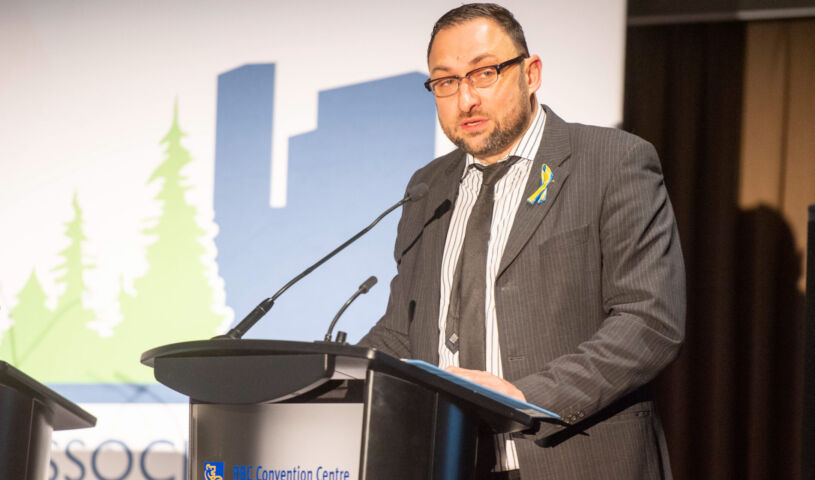Unique 2023 sets up Manitoba municipalities for 2024 success
 The Association of Manitoba Municipalities faced a unique year in 2023. But Denys Volkov says the successes of 2023 have helped set up a successful 2024. Photo: Denys Volkov
The Association of Manitoba Municipalities faced a unique year in 2023. But Denys Volkov says the successes of 2023 have helped set up a successful 2024. Photo: Denys Volkov
Municipalities across the country faced significant challenges in 2023. Pandemic recovery, affordability, public safety, and of course housing were all on the agenda of councils both large and small.
But in Manitoba, things were also complicated by a provincial election. This meant an added workload for not only municipalities, but also the organization that works to champion their needs.
Denys Volkov is executive director of the Association of Manitoba Municipalities (AMM). Volkov describes 2023 as a “unique year” for Manitoba municipalities.
Coming out of the COVID-19 pandemic, Volkov said a lot of municipalities accrued heavy losses. A lot of community centres and arenas were closed. And bills still had to be paid. To this day, some municipalities are still experiencing challenges paying off those debts.
“There were a lot of challenges on the fiscal side in Manitoba as well as the rest of Canada,” Volkov said. “And we had a provincial election. So, we at Association of Manitoba Municipalities ran a provincial campaign, influencing all political parties that ran in the last election. So, yes, 2023 was quite a year for us.”
Big Challenges in 2023
AMM spent a significant part of 2023 focused on the provincial election. The plan being to focus on the top four issues so as to influence the provincial parties striving for power.
Perhaps the key priority was supporting improved municipal funding to ensure predictable and stable transfer funds from the province. Volkov said the conversation focused on a funding escalator that could be predictable and that all municipalities could rely on year after year.
Another area was infrastructure. All municipalities across Manitoba experience infrastructure deficits. Municipalities, Volkov said, cannot go it alone when they’re collecting only 8-10 cents on every tax dollar while being responsible for 60 per cent of infrastructure. This is especially problematic when it comes to water and wastewater. So, AMM pushed hard for the creation of a special fund for these areas.
Health care is an issue that seems to be top of mind across the country. Volkov said many Manitoba communities are facing shortages of doctors and related health care professionals. Yes, health care is a provincial area of responsibility. But because of shortages, municipalities are trying to step in to provide incentives to attract more doctors. So, AMM committed to working closely with the province to improve this situation.
And the fourth area was public safety. Volkov said Manitoba municipalities are seeing, “massive, double digit increases in crime – rural crime, urban crime, all sorts of types of crimes.” He said this is a phenomenon that is also affecting other prairie provinces. AMM was advocating for what he called “sweeping measures” on the public safety side.
Volkov said AMM was seeing gains on some of these issues under the province’s now former PC government. But with the new NDP government under Premier Wab Kinew, Volkov said there are already conversations on creating change under all the AMM’s priorities.
“They campaigned heavily on addressing health care shortages. So, we expect in that particular area to see some wins soon,” Volkov said. “And we’ve heard some positive comments from them in all the other areas – public safety, municipal funding, and infrastructure. But the proof will be in the pudding, of course.”
Calls for a New Fiscal Deal
The funding issues facing municipalities has renewed the calls for a more sustainable financial situation. AMM has joined the Federation of Canadian Municipalities (FCM) and other provincial municipal associations in calling for a new deal.
Volkov said he was encouraged in 2023 that the argument for a better municipal deal seemed to finally be taking hold.
Volkov praised the work of FCM in “shifting the conversation” around that new model. He also added this shift is essential as municipalities have far more responsibilities than they had when they were set up more than 100 years ago.
So, if municipalities are doing more, Volkov said they need stronger tools. And he is quick to add that residents today expect services to be provided much more quickly and at a higher level.
“That comes at a cost. And the old model of relying on property taxes is not working well,” Volkov said. “Property taxes alone cannot pay for all the services that our residents would like to see. So we do want to see from provincial and federal governments a commitment to look at the model. It has to change.”
As hectic as 2023 was for Manitoba municipalities, things weren’t any easier for the AMM.
Volkov said 2023 saw AMM enjoy the “largest number of policy wins in any single year” for the organization. Credit for that, he adds, goes to the work of his staff, the AMM board, and board president, Kam Blight. Volkov praised them all for their passionate commitment to moving in one direction.
Big Wins in 2023
The biggest win for AMM in 2023 was seeing the province remove the funding freeze for municipalities. The freeze was put in place in 2016 by then-premier Brian Pallister in his drive to balance the provincial budget.
Volkov credits AMM’s lobbying efforts for not only getting the freeze removed, but also seeing it replaced with double digit increases across the board. Municipalities also received millions in funding to support various infrastructure projects.
Volkov understands 2023 was an election year and funding announcements are the currency of many governments. But even so, he couldn’t be more pleased with what AMM accomplished.
“In an election year, provincial and federal governments like to spend money. I understand that,” Volkov said. “But it was nice to be a recipient of those monies because money could have gone to other areas, sectors. But the municipal sector for sure last year experienced a lot of positives.”
What Lies Ahead
As significant as 2023 may have been, Volkov said he is looking forward to what is to come in 2024. For one, his expectation is the provincial government will start implementing the AMM recommendations in those key areas. And that there will be some concrete results stemming from them.
On public safety, Volkov said he would love to see bail reform legislation at the federal level. With support from many provincial premiers, and the House of Commons, Volkov said he would like to see the Senate sign off on bail reform.
Volkov said he hopes to see adequate funding of health care professionals and a further “chipping away” at municipal infrastructure deficits through proper funding.
These items, he adds, will hopefully be addressed in the new provincial budget. While the government may not address everything in one year, Volkov said AMM is ready to work with the province and build upon the strong relationship already forged with the new premier. “And they’ve been responsive to what we’ve been saying,” Volkov said.
Difficult Time for Politicians
Volkov acknowledges it is “very hard right now to be a municipal official.” This is especially true because, as he puts it, “For 99 per cent of all members, municipal officials, this is not their full-time job.”
This makes it even more difficult when they experience harassment of one kind or another. But even when it does occur, AMM is there to support elected officials. That support comes through training and working with the province to make sure elected officials have the tools they need.
“I believe in Canada because we have democracy, we have elections, we have freedom of the press, we have resources like this interview,” Volkov said. “Through all those processes, we can achieve better municipal government. Yes, I do believe that.” MW
✯ Municipal World Executive and Essentials Plus Members: You might also be interested in Meyer’s article: National strategy invests in municipal resiliency.
Sean Meyer is Digital Content Editor for Municipal World.
Related resource materials:



